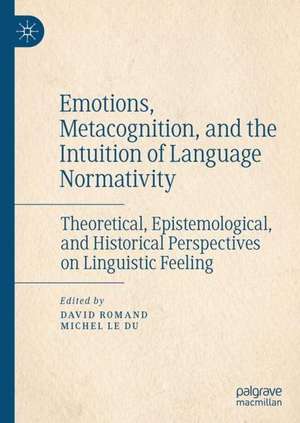Emotions, Metacognition, and the Intuition of Language Normativity: Theoretical, Epistemological, and Historical Perspectives on Linguistic Feeling
Editat de David Romand, Michel Le Duen Limba Engleză Hardback – 27 mai 2023
Preț: 951.14 lei
Preț vechi: 1159.94 lei
-18% Nou
Puncte Express: 1427
Preț estimativ în valută:
182.02€ • 189.79$ • 151.28£
182.02€ • 189.79$ • 151.28£
Carte tipărită la comandă
Livrare economică 21 martie-04 aprilie
Preluare comenzi: 021 569.72.76
Specificații
ISBN-13: 9783031179129
ISBN-10: 3031179129
Ilustrații: XIII, 367 p. 2 illus.
Dimensiuni: 148 x 210 mm
Greutate: 0.61 kg
Ediția:2023
Editura: Springer International Publishing
Colecția Palgrave Macmillan
Locul publicării:Cham, Switzerland
ISBN-10: 3031179129
Ilustrații: XIII, 367 p. 2 illus.
Dimensiuni: 148 x 210 mm
Greutate: 0.61 kg
Ediția:2023
Editura: Springer International Publishing
Colecția Palgrave Macmillan
Locul publicării:Cham, Switzerland
Cuprins
1. Introduction.- Part I Cross-disciplinary Approaches to Linguistic Feeling from Herder to Wittgenstein.- 2. “What the Germans Call Sprachgefühl.” Sprachgefühl in Early German Linguistics. Selected Examples of Ways of Understanding.- 3. Assent, Sentiment and Linguistic Feeling in Jac. van Ginneken’s Psycholinguistics.- 4. On the Normative Side of Saussure’s “Linguistic Feeling”.- 5. Sapir's Form-Feeling and its Historical Context.- 6. Edward Sapir: Form-Feeling in Language, Culture, and Poetry.- 7. Meaning-Blindness, and Linguistic Feeling: Wittgenstein on How We “Experience” Meaning.- Part II Current Scientific and Philosophical Perspectives on Linguistic Feeling.- 8. Intuitions in Linguistics: A Blessing or a Curse?.- 9. The Good, the Bad, and the Yucky: Valenced Linguistic Intuitions and Linguistic Methodology.- 10. Linguistic Feeling in Real Life and in Linguistics.- 11. Linguistic Feeling and Grammaticalization: From Concepts to Case Studies.- 12. LinguisticFeeling: A Relational Approach Incorporating Epistemology, Theories of Language, and Human-Machine Interaction.
Notă biografică
David Romand is a philosopher, historian of knowledge, and language theorist, currently an associate researcher at Centre Gilles-Gaston Granger, Aix-Marseille University (France). As a language theorist, he is particularly interested in semantic, semiotic, and metalinguistic issues, with a strong focus on the German-speaking context and affective science.
Michel Le Du is full professor of philosophy at the University of Aix-Marseille and a member of the Centre Gilles-Gaston Granger. He co-edited the volume Wittgenstein and Aesthetics, Perspectives and Debates (Berlin, Ontos, 2011) and has also written numerous papers on Wittgenstein, philosophy of mind and philosophy of social sciences.
Michel Le Du is full professor of philosophy at the University of Aix-Marseille and a member of the Centre Gilles-Gaston Granger. He co-edited the volume Wittgenstein and Aesthetics, Perspectives and Debates (Berlin, Ontos, 2011) and has also written numerous papers on Wittgenstein, philosophy of mind and philosophy of social sciences.
Caracteristici
Provides, for the first time in English, a synoptic and multifaceted study of the issue of the linguistic feeling Traces the expression 'linguistic feeling' from its appearance in the early 19th century to the present Addresses the crucial question of the relationship between the linguistic feeling and affectivity
